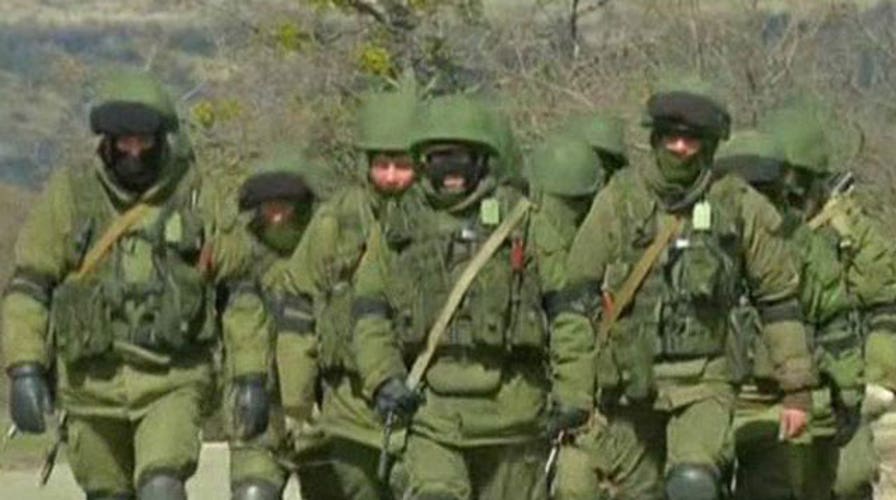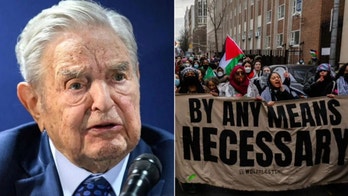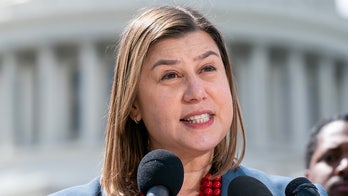Fighting words from Vladimir Putin?
KT McFarland: Crimea crisis reveals that the 'gloves are off'
Russia reportedly is prepared to change its stand on Iran nuclear talks in a high-stakes gamble to counter expanded sanctions by the United States and the European Union over Crimea.
After the Obama administration on Monday hit 11 Russian and Ukrainian officials with sanctions -- a move criticized by Republican lawmakers as too timid -- Russia's Deputy Foreign Minister Sergei Ryabkov was quoted Wednesday by the Interfax news agency as saying the country may have to alter its position on the negotiations over Iran's nuclear program.
The statement is the most serious threat of retaliation by Moscow since the disputed Crimea region voted to join Russia over the weekend, and Vladimir Putin's government moved to annex the peninsula.
NATO and U.S. leaders say they're prepared to do more.
White House Press Secretary Jay Carney said Wednesday that the administration is looking to expand the sanctions further. "If you look at the executive orders, they provide a great deal of flexibility and an expansive range potential designations for sanctions including Russian government officials, the arms sector of Russia, and individuals who, while not holding positions within the Russian government, have influence over or provide material support to senior Russian government officials," he said.
NATO Secretary General Anders Fogh Rasmussen on Wednesday called Russia's advances in Ukraine a "wake-up call" -- and the "gravest threat to Europe since end of Cold War."
Speaking at the Brookings Institution in Washington, D.C., he also said NATO, as a first step, is suspending joint planning for operations removing chemical weapons from Syria.
Ukraine's security chief also announced Wednesday that his country will hold joint military exercises with the United States and Britain. Andriy Parubiy, secretary of Ukraine's National Security and Defense Council, said Ukraine will hold military maneuvers with the countries that signed the 1994 Budapest Memorandum. He didn't elaborate. The document was signed by the U.S., Britain and Russia to guarantee Ukraine's territorial integrity when it surrendered its share of Soviet nuclear arsenals to Russia after the Soviet Union broke up in 1991. Ukraine has accused Russia of breaching the agreement by taking over the Crimean Peninsula.
The United Nations is also deploying a 34-member human rights monitoring mission to Ukraine, scheduled to be in place by Friday. Ivan Simonovic, assistant secretary-general for human rights, expressed particular concern over the security of Tatars and other ethnic minorities in Crimea.
Simonovic highlighted the disappearance of a Crimean Tatar activist after participating in a March 3 protest. Simonovic said the activist was found dead March 16 and his body bore marks of "mistreatment."
Just back from a visit to Ukraine, Simonovic spoke at a tense meeting of the Security Council. It was the council's eighth meeting in three weeks on Ukraine.
Once again, Russian Ambassador Vitaly Churkin was alone in defending his country's actions in Crimea. He began his speech by celebrating the treaty signed a day earlier by Putin declaring Crimea part of Russia.
"Yesterday, something truly historic happened," Churkin declared.
U.S. Ambassador Samantha Power warned Russia that the U.S. and its allies "are prepared to take additional steps if Russian aggression or Russian provocations continue."
Meanwhile, leading members of Congress are demanding that the Organization for Security and Cooperation in Europe immediately deploy international monitors to eastern and southern Ukraine.
A letter sent by Sen. Dick Durbin, an Illinois Democrat, Arizona Republican Sen. John McCain, and six other lawmakers says monitors are needed to defuse tensions in Ukraine after Russia's takeover of the Crimean peninsula. The lawmakers visited Ukraine last week and say Russia is using "provocateurs and intelligence agents to brazenly stir trouble" in eastern Ukraine as a possible "manipulated pretext for additional military action."
The OSCE is a 57-nation body based in Vienna, and Russia has thus far blocked such a deployment.
The Associated Press contributed to this report.





